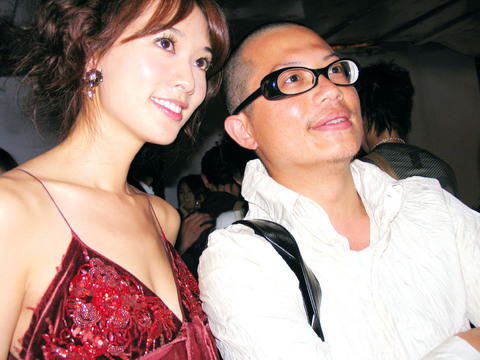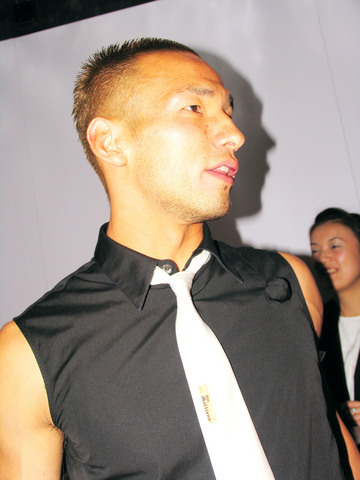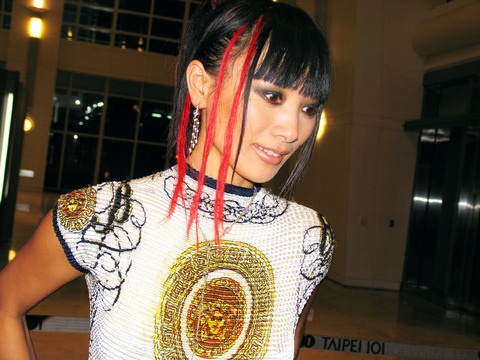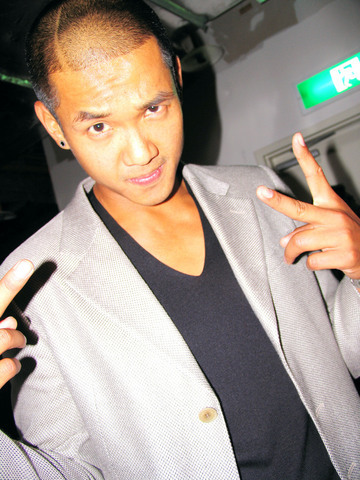If the attendees at the WE MEN magazine launch party last Saturday on the 86th floor of the 101 building are any indication of who will grace the pages of the latest addition to Taiwan's newsstands, then get set for one more magazine full of Asian models, celebrities and pop stars.
Among pages of beautiful models, expensive clothes and accessories are articles, in both English and Chinese, aimed at savvy, fashion-conscious readers. WE's emphasis on style, with pages devoted to high-end clothing and male skin-care products, might not appeal to Maxim readers, but it's not trying to. It's directed at a consumer society where looking good is equally important to being good.
Praised as the David Beckham of Asia, Nakata was surrounded by a troupe of models during the party. He didn't show much love to Taiwan's reigning prima donna Lin Chih-ling (林志玲), but seemed taken with Sun Zheng-hua (孫正華) instead. Bai Ling (白靈) also turned up, after managing to flash her breasts and underpants at an earlier press conference last Saturday.

PHOTOS: JULES QUARTLY, TAIPEI TIMES
The magazine's editor-in-chief, Kevin Lee (李冠毅), writes in his introductory letter that WE MEN caters to a new breed of men in the 21st Century and serves as a reference point for those who want to strive to be a better man for the woman he loves."
WE is the project of Lee, who assumes the role of editor-in-chief, creative director and publisher. It is a Taiwanese version of the Hong Kong-based West East Magazine, which explains why Lee's premier issue is filled with references to and articles from Hong Kong. This will all change when the Taiwanese editorial staff releases its official first edition in September.




June 23 to June 29 After capturing the walled city of Hsinchu on June 22, 1895, the Japanese hoped to quickly push south and seize control of Taiwan’s entire west coast — but their advance was stalled for more than a month. Not only did local Hakka fighters continue to cause them headaches, resistance forces even attempted to retake the city three times. “We had planned to occupy Anping (Tainan) and Takao (Kaohsiung) as soon as possible, but ever since we took Hsinchu, nearby bandits proclaiming to be ‘righteous people’ (義民) have been destroying train tracks and electrical cables, and gathering in villages

This year will go down in the history books. Taiwan faces enormous turmoil and uncertainty in the coming months. Which political parties are in a good position to handle big changes? All of the main parties are beset with challenges. Taking stock, this column examined the Taiwan People’s Party (TPP) (“Huang Kuo-chang’s choking the life out of the TPP,” May 28, page 12), the Democratic Progressive Party (DPP) (“Challenges amid choppy waters for the DPP,” June 14, page 12) and the Chinese Nationalist Party (KMT) (“KMT struggles to seize opportunities as ‘interesting times’ loom,” June 20, page 11). Times like these can

Dr. Y. Tony Yang, Associate Dean of Health Policy and Population Science at George Washington University, argued last week in a piece for the Taipei Times about former president Ma Ying-jeou (馬英九) leading a student delegation to the People’s Republic of China (PRC) that, “The real question is not whether Ma’s visit helps or hurts Taiwan — it is why Taiwan lacks a sophisticated, multi-track approach to one of the most complex geopolitical relationships in the world” (“Ma’s Visit, DPP’s Blind Spot,” June 18, page 8). Yang contends that the Democratic Progressive Party (DPP) has a blind spot: “By treating any

Swooping low over the banks of a Nile River tributary, an aid flight run by retired American military officers released a stream of food-stuffed sacks over a town emptied by fighting in South Sudan, a country wracked by conflict. Last week’s air drop was the latest in a controversial development — private contracting firms led by former US intelligence officers and military veterans delivering aid to some of the world’s deadliest conflict zones, in operations organized with governments that are combatants in the conflicts. The moves are roiling the global aid community, which warns of a more militarized, politicized and profit-seeking trend